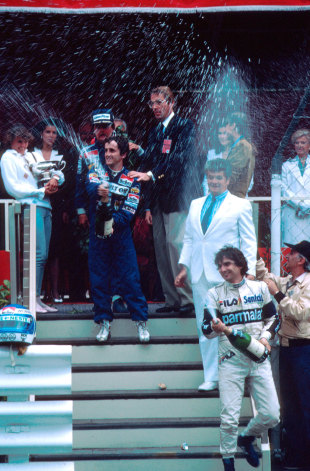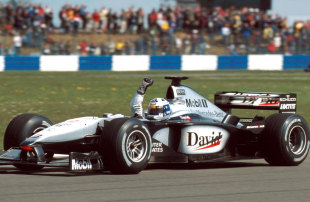
- Drivers:
- Jean-Pierre Beltoise
- |
- Gerhard Berger
- |
- David Coulthard
- |
- Juan Manuel Fangio
- |
- Jo Gartner
- |
- Nico Rosberg
- |
- Archie Scott-Brown
- |
- Piero Taruffi
Four races in 2012, and four different winners - has this ever happened before? asked Mark Robson
I thought this would be rather unusual, and indeed it has happened only once since 1983: in 2003, when the first four GPs of the season were won by David Coulthard, Kimi Raikkonen, Giancarlo Fisichella and Michael Schumacher. But before that it was reasonably commonplace, happening nine times in all between 1961 and 1983. Indeed, on three occasions the first five races of the season have been won by different people: in 1967 (Pedro Rodriguez, the eventual champion Denny Hulme, Jim Clark, Dan Gurney and Jack Brabham), 1975 (Emerson Fittipaldi, Carlos Pace, Jody Scheckter, Jochen Mass and champion Niki Lauda), and 1983 (champion Nelson Piquet, John Watson, Alain Prost, Patrick Tambay and Keke Rosberg). There's a case for saying that, in 1951, the first six races were won by different people, but that includes one race where the win was shared between two drivers, Juan Manuel Fangio (who won one of the others) and Luigi Fagioli. It also includes the Indianapolis 500 (won that year by Lee Wallard) which counted towards the F1 world championship at the time.
Is it really more than 50 years since a Mercedes car won a Grand Prix? I must be getting old! asked James Simpson
I'm afraid so: before Nico Rosberg's stunning win in this year's Chinese GP, the last victory by a Mercedes car was in the Italian GP of 1955, when the world champion Juan Manuel Fangio led home his team-mate Piero Taruffi at Monza, where the scary high-speed banking was being used for what was the last race of the season. Mercedes had announced their withdrawal from Grand Prix racing earlier that year, so it was already known that the "Silver Arrow" cars wouldn't be seen for some time. Mercedes engines have, of course, recorded several Grand Prix victories in the intervening 56 years, most notably as the power unit for McLaren's cars since 1995."
Who was the last man to win a Grand Prix in a BRM? asked Jim Constantine
BRM, which stood for British Racing Motors, were in their heyday in the 1960s: Graham Hill won the world title in one in 1962. BRM won the Constructors' championship that year too. In all BRM won 17 GPs, the first by Jo Bonnier in the 1959 Dutch GP. Graham Hill won ten of those races, including a famous hat-trick at Monaco, and there were also two victories for the young Jackie Stewart. Pedro Rodriguez won in Belgium in 1970, and the following year Jo Siffert took the chequered flag in Austria and Peter Gethin won a famous slip-streaming battle in Italy. BRM's final GP victory came on a wet day in Monaco in 1972, when Jean-Pierre Beltoise led the field home. BRM, which had been founded in 1945, carried on in F1 until 1977.

Does David Coulthard hold the record for most Grand Prix victories without ever winning the world championship? asked Kevin Scott
David Coulthard won 13 GPs (the same as Jenson Button as I write) during his distinguished career - but never won the world championship, his best position being a rather distant second, behind Michael Schumacher, in 2001, after finishing third in four of the previous six seasons. Only 17 men have won more GPs than Coulthard, and 16 of them have been world champions: the exception is another Briton, Sir Stirling Moss, who won 16 GPs but famously never quite finished on top of the championship table.
Who was the shortest F1 driver of all time? asked Chris Morris
This is not an exact science, as we just do not know the heights of many F1 drivers, especially the early ones. I found a suggestion online that John Love, the Rhodesian driver who almost won the 1967 South African GP (he finished second after a late pit-stop for fuel), was only 4ft 9ins tall, but I'm not convinced this is true - I haven't seen anything anywhere else remarking on his stature. The shortest driver I know of was Archie Scott-Brown, who took part in the 1956 British GP. His mother had suffered from German measles while pregnant, and Archie was born with a deformity which left him with shortened legs and a withered left arm - yet through determination and ability he carved out a successful career as a sports-car driver in the 1950s. Scott Brown, who was killed in an accident at Spa in 1958, was only about 5ft tall, if that. His inspirational story is told in a fine book, Archie and the Listers (1995).
Gerhard Berger finished sixth in the 1984 Italian GP, yet he's not credited with any points that season. Why not? asked Craig Hamilton
This came about because Gerhard Berger, in the early stages of his F1 career, was driving the second ATS car in the Italian GP in September - and, before the season had started, ATS had officially entered only one car (for Manfred Winkelhock). Sadly for Berger, this meant that, under the regulations in force at the time, his was ineligible to score points. Both Berger and his fellow Austrian Jo Gartner, who finished fifth at Monza in an Osella, fell foul of this rule and were not credited with any points.
If you want to ask Steven a question, use our feedback form. The most interesting questions will be answered here every other Friday. His long-running Ask Steven column on Cricinfo remains one of that site's most popular features
© ESPN Sports Media Ltd.
 If you want to ask Steven a question, use our feedback form. The most interesting questions will be answered here every other Friday. His long-running Ask Steven column on Cricinfo remains one of that site's most popular features Ask Steven features a number of experts, headed by Steven Lynch, who answer your questions across Formula One as well as a variety of other sports
If you want to ask Steven a question, use our feedback form. The most interesting questions will be answered here every other Friday. His long-running Ask Steven column on Cricinfo remains one of that site's most popular features Ask Steven features a number of experts, headed by Steven Lynch, who answer your questions across Formula One as well as a variety of other sports

